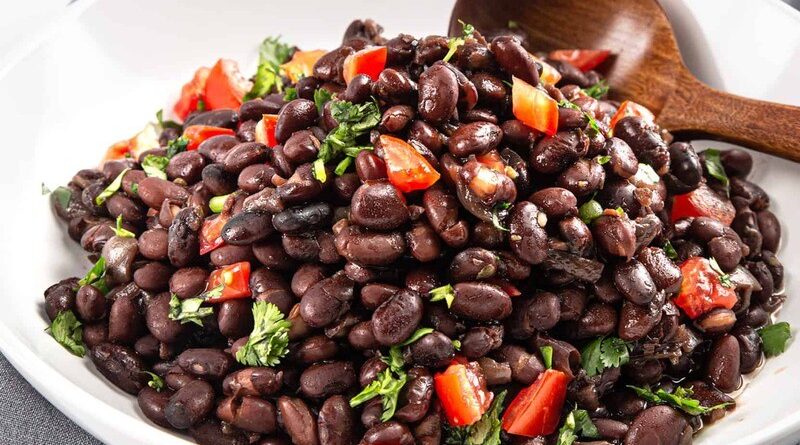Are Black Beans Healthy? Discover the Health Secrets
Black beans are valued for their various health advantages in addition to their rich flavor, making them a staple in many different cuisines across the globe. We examine the subject, “Are black beans healthy?” in this article. We hope to provide you with a thorough understanding of why black beans should be a part of your diet by examining their possible health benefits and practical strategies to include them in your diet. Come along as we explore the goodness these modest legumes have to offer.
Health Benefits of Black Beans
- A nutrient-dense powerhouse, black beans have numerous health advantages.
- Black beans, being high in protein, aid in the growth and repair of muscles.
- A high-fiber diet helps control weight and supports digestive health.
- Antioxidants included in black beans offer defense against inflammation and oxidative damage.
- By controlling blood pressure and decreasing cholesterol, they also promote heart health.
- Black beans have a low glycemic index, which aids with blood sugar regulation.
- Rich in nutrients, they offer vital vitamins and minerals for general health.
- Including black beans in meals promotes a varied nutritional intake and a balanced diet.
- Regularly including black beans in your diet can improve your general wellness and overall health.
Role of Black Beans in a Balanced Diet
Powerful in terms of nutrition, black beans are essential to eating a balanced diet. Black beans are rich in fiber, protein, and other vital components and have several health advantages. Including black beans in your meals promotes digestive health, helps you reach a balanced macronutrient profile, and gives you essential nutrients for general health. Black beans are a versatile and nutrient-dense food that may be used in salads, soups, tacos, and burgers to support optimum health and energy.
Incorporating Black Beans into Different Recipes
Black beans are quite adaptable and can be used to enhance taste, texture, and nutritional value in a variety of recipes. Here are also a few inventive and delectable ways to include black beans in your dishes:
Black Bean Salad:
Cooked black beans should be combined with chopped tomatoes, bell peppers, onions, and cilantro.
For a light and nourishing meal, dress the salad with a zesty vinaigrette composed of olive oil, lime juice, garlic, and cumin.
Black Bean Soup:
Tenderize black beans by simmering them in vegetable broth along with onions, garlic, carrots, and celery.
For a filling and hearty soup, blend the ingredients until smooth and add seasonings such as paprika, hot red chili powder, and cumin.
Black Bean Tacos:
Spoon seasoned black beans, avocado slices, shredded lettuce, sliced tomatoes, and salsa onto taco shells or tortillas.
For more flavor and richness, top with a dollop of sour cream or Greek yogurt.
Black Bean Burgers:
Add breadcrumbs, chopped garlic, onions, and smoky paprika to cooked black beans to mash them up.
Patties should made out of the mixture and baked or grilled until crispy and golden brown. Serve with your preferred toppings on whole grain buns.
Black Bean and Corn Salsa:
Combine corn kernels, chopped tomatoes, red onions, cilantro, jalapeños, lime juice, and black beans with a dash of salt.
Use as a salsa to go with tortilla chips or as a garnish for tacos, grilled chicken, or fish.
Black Bean Quinoa Salad:
Cooked quinoa should combine with black beans, diced bell peppers, avocado, cucumber, and fresh herbs, such as cilantro or parsley.
For a wholesome and filling dinner, dress the salad with a basic vinaigrette consisting of olive oil, lemon juice, garlic, and Dijon mustard.
Stuffed Bell Peppers:
Remove the seeds and membranes from bell peppers by cutting them in half. Layer cooked black beans, quinoa, high protein cheese, and chopped veggies inside each pepper half.
Before serving, top with fresh herbs and bake until the peppers are soft and the filling is heated through.
Impact of Black Beans on Heart Health
Nutrient-dense black beans are heart-healthy legumes that promote cardiovascular well-being. Their potassium helps control blood pressure, and their soluble fiber level helps decrease LDL cholesterol.
Black beans have antioxidants that fight oxidative stress and lower the risk of heart disease. Their low glycemic index also encourages steady blood sugar levels. You can lower cardiovascular risk factors and improve heart health by including black beans in your diet.
Black Beans and Digestive Health
Packed with nutritional fiber, black beans help to maintain regular bowel movements and ward off constipation, all of which are beneficial to digestive health. While the insoluble fiber in black beans gives stools more volume and supports digestive health overall, the soluble fiber in the beans helps control blood sugar levels.
Black beans also maintain a healthy gut microbiome by feeding good gut bacteria and acting as prebiotics. Including black beans in your diet can promote weight management, avoid digestive issues, and improve your general health.
Conclusion
To sum up, black beans are a nutritional powerhouse in addition to being a gourmet marvel. Their many health advantages, which include supporting heart health, helping with weight control, and encouraging muscle recovery, are equal to their rich flavor.
Black beans are a tasty and easy method to improve your diet and general well-being because of how versatile they are in so many different recipes. You may take advantage of the health benefits of a well-balanced diet and the goodness found in these modest legumes by including black beans in your meals regularly.
You Can Read More About Beans
Are Refried Beans Healthy? Discover Their Surprising Benefits
Unlock Your Health Potential with Delicious High Protein Beans
The Ultimate Guide to the Nutrition of Canned Green Beans
